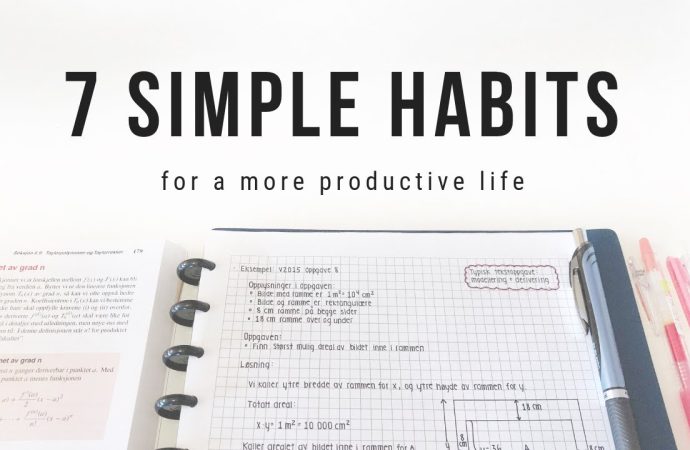Introduction It can feel like a balancing act to keep life orderly. The next ball is coming at you as quickly as you are able to catch the previous one, such as money, family obligations, or fun with friends. Some things are unavoidable, though: weeks of not prioritizing sleep, eating fast food rather than preparing
Introduction
It can feel like a balancing act to keep life orderly. The next ball is coming at you as quickly as you are able to catch the previous one, such as money, family obligations, or fun with friends. Some things are unavoidable, though: weeks of not prioritizing sleep, eating fast food rather than preparing meals, and putting off important work in favor of low-impact activities.
Rather than splurging through life’s responsibilities in the hopes that you’ll somehow manage to do them all, use a framework to keep everything in order.
Living an Organized Life doesn’t mean being perfect; it means having systems in place to keep things in order. An organized life reduces stress, improves productivity, and makes daily tasks easier. If you often find yourself overwhelmed by clutter, missed deadlines, or last-minute plans, incorporating simple habits into your routine can make a big difference. This article explores ten easy-to-follow habits that can help you live a more structured and peaceful life.
The Framework for Organizing Your Life

Image by: Yandex.com
Rules may seem inflexible and unappealing: do this, not that. In actuality, however, it can be liberating to live by a set of rules. We reduce the analysis paralysis that comes with choice and the suffering that results from indecision when we have a preset set of ways we want to act. We include “Experiment” in this framework so that you can discover the joyful accidents in life without feeling like everything is going out of control, but it’s not to imply that life shouldn’t involve some serendipity.
You may arrange your life in a way that brings peace to your days and order to your weeks by adhering to a few basic guidelines and using them consistently.
1. Create a Daily To-Do List

Image by: Yandex.com
A to-do list keeps you focused and prevents you from forgetting important tasks. Writing down what needs to be done helps you prioritize effectively.
- Use a planner or a mobile app to jot down your daily goals.
- Break large tasks into smaller, manageable steps.
- Check off completed tasks to stay motivated.
2. Declutter Regularly
Clutter can make any space feel overwhelming. Developing the habit of decluttering can make your home and workspace more functional.
- Dedicate 10–15 minutes daily to tidying up.
- Follow the one in, one out rule—if you buy something new, donate or discard an old item.
- Organize items based on frequency of use to maximize efficiency.
3. Set a Nighttime Routine

Image by: Yandex.com
A well-planned nighttime routine sets the tone for a productive day. Prepping at night prevents a chaotic morning rush.
- Lay out your clothes and pack essentials for the next day.
- Create a wind-down routine, such as reading or journaling, to relax before bed.
- Review your schedule to prepare mentally for the following day.
4. Stick to a Cleaning Schedule
Keeping your home clean doesn’t have to be overwhelming. Creating a cleaning schedule helps maintain order.
- Assign different tasks to specific days (e.g., Monday: Laundry, Wednesday: Dusting).
- Tackle small cleaning tasks daily to prevent buildup.
- Use timers to make cleaning more manageable and efficient.
5. Manage Your Finances Wisely

Image by: Yandex.com
Organizing your finances reduces financial stress and helps you stay on track with your budget.
- Track expenses using a budgeting app or journal.
- Set up automatic bill payments to avoid late fees.
- Regularly review your finances to identify areas for savings.
6. Plan Your Meals in Advance
Meal planning saves time, money, and prevents last-minute unhealthy choices.
- Create a weekly menu and grocery list.
- Prepare meals in bulk and store portions for busy days.
- Keep staple ingredients stocked to avoid frequent store trips.
7. Use a Calendar for Scheduling

Image by: Yandex.com
A well-organized calendar system prevents double-booking and missed appointments.
- Use a digital or paper planner to track meetings, birthdays, and deadlines.
- Set reminders for important events.
- Block time for self-care and relaxation.
8. Prioritize Self-Care
An organized life also means making time for yourself. Balancing Work and Relaxation keeps you productive and stress-free.
- Schedule breaks throughout the day.
- Engage in activities that promote well-being, like meditation or exercise.
- Avoid overcommitting—learn to say no when necessary.
9. Limit Screen Time

Image by: Yandex.com
Excessive screen time can lead to distractions and wasted hours. Setting healthy limits improves focus and time management.
- Set specific time blocks for social media and email checking.
- Use apps that track and limit screen usage.
- Establish tech-free zones, such as the dining table and bedroom.
10. Keep a Minimalist Mindset
Simplicity leads to better organization. Minimalism encourages focusing on what truly adds value to your life.
- Ask yourself, “Do I really need this?” before making a purchase.
- Regularly reassess belongings and remove unnecessary items.
- Value experiences over possessions.
Using the Framework
You can use the Organize Your Life framework in a variety of areas of your life now that you are aware of its 10 components. You may tackle each area with greater confidence and less worry if you have some clear principles.
Work
Most of your waking hours are probably spent at work. The majority of individuals truly plan their life around their jobs. There are countless discussions about how to plan our free time, including early mornings, lunch breaks, and late evenings. There is less focus on how people should plan their workdays and maximize the eight hours they will probably spend at a desk.
Table: Daily Habits for an Organized Life
| Habit | Benefits | Time Required |
|---|---|---|
| To-Do List | Increases productivity, reduces forgetfulness | 5 minutes |
| Decluttering | Creates a cleaner, stress-free space | 10 minutes |
| Night Routine | Prepares for a smooth morning | 15 minutes |
| Cleaning Schedule | Keeps home tidy without overwhelming effort | Varies |
| Financial Management | Reduces stress, prevents late payments | 10 minutes |
| Meal Planning | Saves money and time | 30 minutes weekly |
| Calendar Management | Avoids scheduling conflicts | 5 minutes daily |
| Self-Care | Improves overall well-being | 20 minutes |
| Limiting Screen Time | Increases focus and productivity | Varies |
| Minimalism | Promotes a clutter-free life | Ongoing |
Conclusion
Living a more organized life doesn’t require drastic changes. By incorporating simple habits like creating to-do lists, decluttering regularly, and setting routines, you can improve productivity and reduce stress. The key is to start small and remain consistent. Over time, these habits will become second nature, leading to a more balanced and structured lifestyle.
















